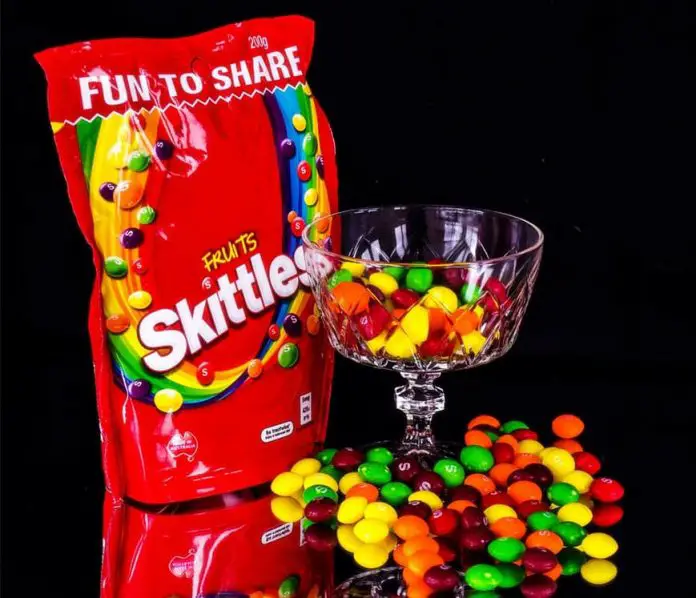Skittles is America’s favorite candy. At $1.98 a pack, it’s a real deal because you can taste more than a handful of “rainbows” wherever, whenever. These candies are fruit-flavored and if your dog happens to love fruits, you might be tempted to offer him Skittles.
You love your dog and you want him to experience all the sweet things in life, including Skittles, but is that a good idea? What if your dog just got into a bag of Skittles by accident? Find out the possible effects of these candies for canines.
Can Dogs Have Skittles?
No. Actually, it’s more a matter of “they can but they shouldn’t”. Skittles are candy and so it is needless to say that they are loaded with sugar. They are not as harmful as chocolates, but the amount of sugar in them can disrupt your dog’s tummy.
Like us, canines could experience an insulin spike after chowing down on candy. The book “Canine Nutrigenomics: The New Science of Feeding Your Dog For Optimum Health” strongly goes against feeding them sugar because of its high glycemic index (GI).
According to Carbs-Information, Skittles have a glycemic index of 70. This amount is quite high, which means this could have a rapid effect on your dog’s blood sugar levels.
Foods with high GI carbohydrates cause the body to create a chronic inflammatory reaction. This can lead to many health complications, such as heart diseases, obesity, and diabetes. High GI foods also contribute to insulin resistance. Insulin is a pancreatic hormone that helps regulate the levels of glucose in the blood.
If your dog is already suffering from any health complications, giving him sugary treats would only make things worse. If the dog is diabetic and ate a lot of Skittles, he will likely end up with a high blood sugar level. As much as possible, avoid sugary treats, including Skittles if your pet is diabetic.
Are Skittles Bad For Dogs?
Not just Skittles, but generally all candies are bad for dogs. Most candies contain chocolate that is considered toxic to them. In the case of Skittles, they contain unhealthy amounts of sugar. Around 75% of this candy is sugar, while the remaining 25% is starch and hydrogenated oil.
Skittles are also scary bad for dog’s teeth. A canine’s teeth are more powerful than a human’s teeth but that does not mean those choppers are free from fractures and cavities. This candy has a 2.5 pH level, enough to cause serious harm to your pet’s enamel.
Dr. Chad Lothamer told that sweets are among the treats that can harm a dog’s teeth. Skittles is a chewy candy that could stick around in your dog’s mouth. Because some Skittles are sour, they can be acidic in nature.
While on the subject of the sourness of Skittles, this also means these candies can be bad for your pet’s tummy. Those lentils may be small but they can be too acidic for a dog. The sour flavor in Skittles is due to the sour sugar or sour sanding in it. This type of sugar is usually done by combining sugar and citric acid.
Health-wise, Skittles does not offer a substantial amount of vitamins and minerals. There is no protein and fiber in it, and contains no calcium, potassium or iron. If you want the best for your dog, forget those treats with unhealthy amounts of processed sugar.
A 14 oz. bag of Skittles already has as much as 160 calories. The sugar quantity is quite high at 30 grams per serving while the saturated fat content is 2 grams. The total amount of carbohydrates is around 37 grams for every ¼ of a cup. Given these numbers, these candies can be identified as an empty-calorie treat essentially because of its high-calorie content and low nutritional profile.
What To Do If Dog Ate Too Many Skittles?
Skittles can cause a mild stomach upset in dogs due to the amount of sugar in it. Gastrointestinal upset is often characterized by vomiting and diarrhea. These are the body’s natural ways of eliminating contaminated substances from the body. Sugar excess can be a toxin to a dog’s body.
The best home remedies for this type of situation include giving your pet a bland diet and acid reducers. You could help your pet settle his stomach by giving him OTC medications such as Famotidine and Omeprazole.
The Famotidine dosage for dogs is 0.25 mg to 0.5 mg per pound not more than twice a day. It reduces the production of stomach acid and prevents ulcers from forming. The most well-known brand of Famotidine is Pepcid.
Omeprazole, on the other hand, works similar to Famotidine that decreases the amount of acid in the stomach. Still, there are many differences between the two. Famotidine is for stomach acid while Omeprazole is for excessive stomach acid and stomach ulcer.
The recommended dosage of Omeprazole for dogs is 0.5 – 1 mg for every kilogram of the dog’s body weight. Keep in mind that it should not be given to dogs more than twice a day. Most vets even recommend administering it only once a day, especially for small dogs.
Omeprazole is said to be more powerful than any types of antacids. Given that, it is best to call your vet first before giving this acid reducer to dog.
Before administering these medications, it would help to let your vet know about it, especially if you have not done it yourself before. Safety is the first thing to consider when administering any form of medication so your vet’s approval is very important.
It will also help to avoid food for 24 hours. Once your pet is prepared to eat, offer a bland diet of chicken and rice. These are ideal for canines with gastrointestinal issues since they are easy to digest while providing your dog with an adequate amount of nutrients and calories. Reintroduce your pet to regular food gradually.
Healthy Snacks for Dogs
You don’t really have to go far when looking for a healthy snack for your pet. The best snacks for your dog may already be in your pantry. Skip the Skittles – your dog deserves so much more than these bite-sized sugar bombs. Here are some of the best dog snacks that are better than candies:
Greek yogurt – dogs are allowed to snack on yogurt as long as they can tolerate lactose. Greek yogurt is the best one for them because it has fewer carbohydrates and sugar.
Apples – dogs can benefit from the antioxidants and fiber in apples. Just make sure the apple was cored and sliced in bite-size chunks before giving it to your dog.
Carrots – are a low-calorie treat that boasts beta-carotene and fiber. This makes carrots a wholesome dog snack that is good for the teeth too since it can get rid of plaque buildup. Just cut them in bite-size chunks before serving them to your dog.
Doggie Trail Mix – there is a plethora of ready-to-eat trail mixes for dogs out there. You just have to choose which one is the best based on the ingredients. But in case you can’t find one that may suit dog’s taste buds, you can actually make a DIY trail mix by gathering your pet’s favorite snacks.
Cantaloupe – this fruit is packed with beta-carotene that can protect dog’s cells from damage and also reduces the risks of cancer and heart diseases. An inch of a cantaloupe wedge will be enough for a pet’s consumption.
Bananas – known for their high potassium content, bananas are great for dogs suffering from hypokalemia or low potassium levels. Banana is a natural source of prebiotics that is beneficial for the growth of healthy bacteria. Give your dog an inch of banana occasionally.
Blueberries – most dogs enjoy eating blueberries because of their slightly tarty and sweet flavor. It’s fine to let your pet eat 2 to 3 blueberries from time to time. They can be your pet’s source of antioxidants as well as Vitamins B, C, and A.
Peanut butter – as long as it is unsalted and free from xylitol, peanut butter is a great snack for canines because it is loaded with magnesium, vitamin E, and heart-healthy fats.
Conclusion
Sugary foods are quite inviting for canines because, like humans, they have the taste buds that react to sweets. But remember that we cannot share all the sweet things with our dogs. Candies, regardless if they are Skittles, are a big no-no for canines.
That does not mean dogs cannot snack on sweets from time to time. Of course, there are fruits that are natural sources of sugar but they are not empty calories and your pet could even benefit from the vitamins and minerals from those types of treats.





















